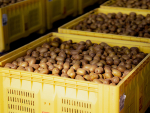Yearly rainfall in 2019 was (50-79%) below normal across Northland, Auckland, Hawke’s Bay, Wairarapa and Marlborough.
Accordingly, 2019 was the fourth warmest year on NIWA’s records for New Zealand since beginning in 1909.
We are observing greater than usual deficiencies at this time of year in essential trace minerals, including magnesium, calcium and even nitrogen.
Growers who rely on soil tests to identify and treat deficiencies are being caught out. This is because with the lack of moisture in the soil, it may be holding these minerals, but they are not being taken up by the plant. So, a leaf test is a better indicator of crop nutrition issues.
Once deficiencies are identified with a tissue test, these can be treated with highly bioavailable foliar minerals to ensure efficient uptake and a swift and positive impact on your crop.
It is important to understand that deficiencies in one year can impact two seasons. Therefore, any deficiencies should be addressed as soon as possible to ensure fruit quality remains high.
For growers who still have time to take tissue samples pre-flower, precise application of only those minerals required, based on the analysis, will allow reallocation of funds to areas of need. We often see that growers apply zinc and boron every season – whether they are required or not. Yet they overlook minerals such as manganese that can aid in pathogen resistance.
For growers who have not taken a tissue test, a multi-mineral booster – applied foliarly, is recommended. This will ensure that plants have a little of all trace minerals – plus magnesium and yeast assimilable nitrogen. Other minerals – such as boron or magnesium – can be added to overcome severe deficiencies.
For those growers, whose crops are now past flowering and at cell division stage, look to use a bio-available calcium product.
The significance of quality mineral nutrition being bioavailable is not to be overlooked. Having minerals that your crops are able to assimilate effectively plays a pivotal role in response mechanisms against pathogens such as Botrytis cinerea and Erysiphe necator (Powdery Mildew).
Electrolytes are also a valuable input to assist crops through times of wilting and stress. When humans experience dehydration, electrolytes are recommended. Plants are no different.
When plants are under stress due to low precipitation, adding a plant electrolyte – such as fulvic acid – can give your crops the jump start they need when irrigation options are limited.
To identify your precise nutrition requirements, take a tissue test and send it to our Roots, Shoots & Fruits nutrition expert for a Balanced Analysis assessment.
















